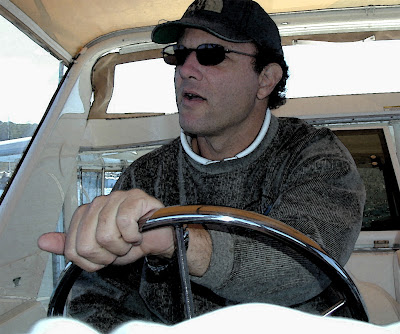As this year’s Father’s Day approached I thought about the father figure role that many uncles play in their nephew’s life. I have a wonderful relationship with my own dad, but my relationship with my uncle was different. He served as a different type of role model for me than my father. My uncle was the one to take me to hockey games and for a ride on the back of a motorcycle. We went on day-long excursions by snowmobile or by boat. It was my uncle who taught me to appreciate an ice cold beer on a hot summer day and a fine glass of wine with good friends as the sun was setting.
While my father taught me to drive, it was my uncle who taught me to drive aggressively and strategically and how to appreciate a luxury automobile. Uncle Jerry showed me by example that hard work pays off. He also demonstrated the value of a good vacation away from the office and the importance of enjoying time with the family.
My uncle had his own children, but he still made time for me and his other nephews and nieces. Just as there is a significant role for a Savvy Auntie to play in one’s life, there is a significant role for a devoted uncle too. The uncle is an unsung hero in society.
As the fond memories of my Uncle Jerry were floating in my head and I was considering the ways he served as a complementary (not surrogate) father figure in my life I was called upon to officiate at a funeral. On the phone, the local funeral director explained that the family was not affiliated with any congregation. He also told me that the contact person would be the deceased’s niece, but that she and her siblings should be treated as the grieving children.
When I arrived at the house to meet with the family in preparation for the funeral the following day, I learned that the man I was to eulogize played a substantial role in the lives of his nieces and nephew. While his own father died when he was just a young boy and he grew up without a father figure in his life, he filled that role outstandingly for his own two children as well as for his three nieces and nephew.
I listened to the stories flying at me from all directions about a man who shed the “Uncle” title and became “Dad” to four children when their own parents were no longer available. I considered how many uncles fill this role for their nieces and nephews. Some uncles, like the man who just departed this earth, step up and take on a father figure role when the need arises, and do so with love and affection. Others, like my own uncle, serve as a father figure in ways that complement the role of a biological father.
Father’s Day was one of my uncle’s favorite days of the year. He loved to open his house to the family and barbeque for us. As everyone was finishing dessert he’d motion to me to go outside and we’d play catch until it was too dark to see the ball. Sometimes I would just watch him hit tennis balls with a golf driver to his eager Golden Retriever. Growing up, I now realize that Father’s Day for me was also a day to honor my uncle and the impact he had on my development.
Just as Melanie Notkin has reframed our understanding of aunthood, I encourage everyone to take into account the special role that uncle’s play in the lives of their nieces and nephews. On this Father’s Day, I will once again pay tribute to the memory of my uncle. Through his actions he was influential in the way I now serve as a father to my own children. While I am not yet an uncle, I know that when the time comes I will look to Uncle Jerry as a role model. His legacy will inspire me to take a father figure approach to being an uncle. In a big way.
Cross-posted to SavvyAuntie.com

